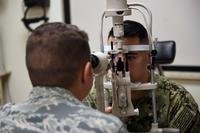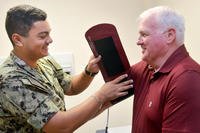By Tom Philpott
The Department of Defense will ask Congress for new authorities to funnel more challenging cases into military treatment facilities, a move aimed at sustaining wartime specialty skills and overall medical readiness, said Dr. Jonathan Woodson, assistant secretary of defense for health affairs.
The effort to enrich the patient mix, particularly for inpatient care, will focus on treating more elderly patients, more veterans with complex conditions who might otherwise be ineligible for on-base care, and more military retirees who also are DoD civilian employees.
Woodson and the surgeon generals of the Army, Navy and Air Force appeared before a House panel in June and largely rejected the sweeping reforms to military health care and the TRICARE benefit recommended by the Military Compensation and Retirement Modernization Commission.
But the commission’s report had Woodson and the uniformed medical leaders defending the effectiveness of military treatment facilities as wartime training platforms, and discussing new ways to attract a more demanding case mix and to expand the workloads of physicians at base hospitals.
“There are going to be some new authorities we’ll need, to allow patients to flow from the market to the MTFs [military treatment facilities] to ensure we have the proper case mix,” Woodson told the House armed services subcommittee on military personnel.
“This is to include new ways of attracting Medicare-aged patients” and perhaps to “actually define a sort of Medicare Advantage within the MTFs. We [also] need to be given broader authorities that relate to taking care of veterans,” Woodson said. “There’s even an opportunity for us to take care of DoD civilians [because] we have a lot of dual-eligible folks who work for the federal government and they have TRICARE benefits. So why not allow them to use their TRICARE benefits within MTFs?”
These steps, he said, “would lead to a proper utilization of the MTFs, proper market management [for] the case-mix, skill-mix issue” that worries commissioners, and “extraordinary service to the beneficiary population.”
Asked when he will seek these authorities, Woodson told us Wednesday that internal discussions to “optimize” use of MTFs continue. He said DoD would work closely and transparently with Congress to give the military health system “greater agility to shape the delivery of healthcare in today’s evolving and fast-moving market place.”
However, any action taken to enhance case mix also would preserve “timely access to care for our existing beneficiaries and enrollees,” he said.
As to which facilities would use new authorities to corral more challenging cases, Woodson said the service medical departments would decide that “based on specific readiness requirements, capabilities and capacity. All decisions will need to be tailored to the geographic locality of the MTF and what those local needs and requirements are.”
The compensation reform commission had urged creation of a four-star Joint Readiness Command to be responsible for preserving medical readiness gains after 14 years of war. In arguing for the new command, commissioners sited data from the health system’s self-analysis during an ongoing modernization study that show many military physicians have light inpatient workloads compared to civilian peers and a mundane case mix when measured against what’s needed to stay ready for war.
The commission’s other major health reform idea is to replace the triple-option TRICARE benefit with TRICARE Choice, a menu of private sector health insurance offerings for military families and retirees to pick their desired coverage. Premiums and co-payments of mid-range plans would be covered for active duty families by a new monthly health allowance.
Woodson and the surgeons general rejected the readiness command as unnecessary and TRICARE Choice as potentially stressful for families and harmful to readiness. By forcing base hospitals to compete with civilian insurers for patients, they said, TRICARE Choice could result in military doctors seeing even fewer patients, aggravating the readiness challenge.
Greater choice through commercial insurance would leave military treatment facilities “at a significant disadvantage in attracting patients,” Rear Adm. C. Forrest Faison, Navy deputy surgeon general, told the House panel.
Army supports “increased choice” for beneficiaries,” said Lt. Gen. Patricia D. Horoho, Army surgeon general. But the TRICARE Choice plan “would negatively impact readiness of our entire health care team and present financial challenges to both active duty families and retirees.”
The surgeons general concurred with commissioners that the military health care system should set training and resource levels so as to preserve essential medical capabilities or EMCs. But the list of EMCs should be more comprehensive than commission’s targeting of combat casualty clinicians and logistical capabilities.
“Those EMCs must address the whole spectrum of health rather than focus solely on combat trauma and surgical capabilities,” said Horoho. She noted that less than one of every five service members evacuated from Iraq or Afghanistan were wounded. Most had diseases or non-battle injuries.
It is true clinical skills needed for wartime deployment “don’t always exactly match up with our day to day practices at home station,” conceded Lt. Gen. Mark A. Ediger, Air Force surgeon general. But the services have known that and have processes in place to track and to augment that experience through partnerships with VA and civilian trauma centers.
Air Force for example, for each of its medical specialties, defines the “case volume and mix and skills that translate into the deployed environment,” Ediger said. “Then we keep records and we track the extent to which we are able to meet those requirements and keep clinicians ready.”
For this year at least, Congress opted not to adopt the commission’s major health reform recommendations. Rep. Tom MacArthur (R-N.J.) is one lawmaker who said his opinion was changed by department testimony.
“I started as an advocate for change,” MacArthur said as the hearing came to a close. “But sometimes the cure can be worse than the illness.”
To comment, write Military Update, P.O. Box 231111, Centreville, VA, 20120 or email milupdate@aol.com or twitter: @Military_Update



